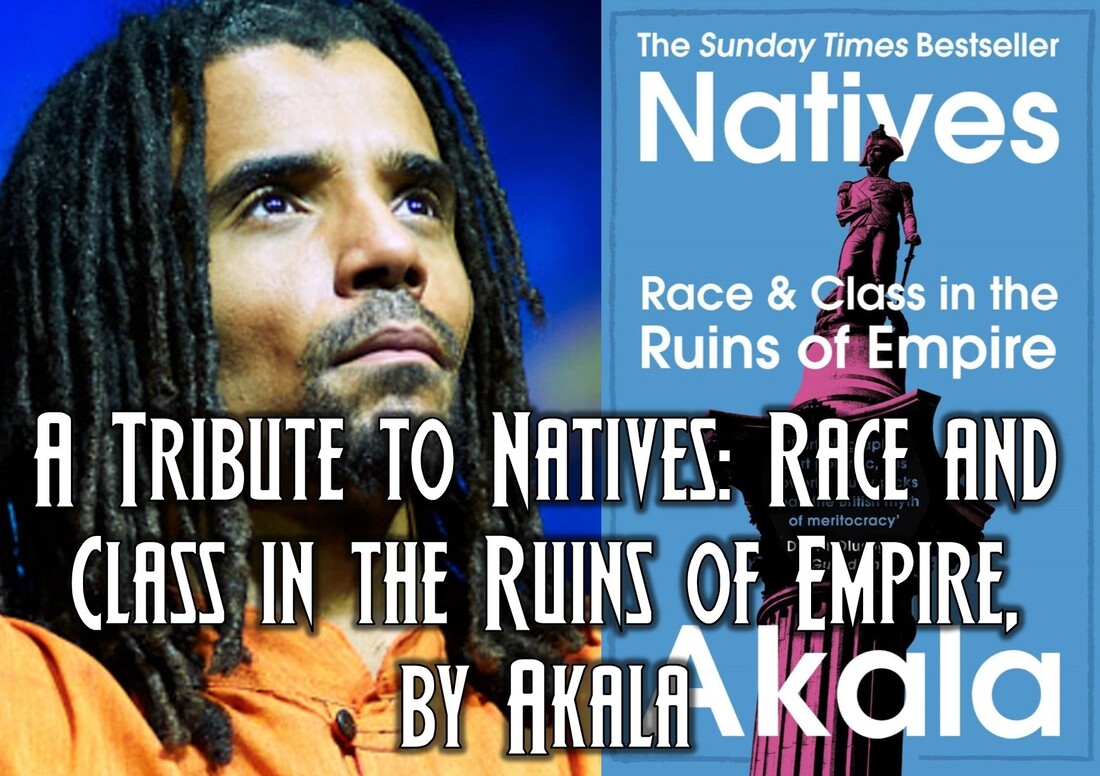|
I recently finished reading Natives: Race and Class in the Ruins of Empire, by Akala. Having taken a few days to collect my thoughts, I have written this review of the book I declare is 'an incendiary dissection of the problems affecting modern society.' I finished reading Natives: Race and Class in the Ruins of Empire the other day, and it’s one that has been whirling around my brain since, so I wanted to write down my thoughts about it. I am a big fan of Akala. When I worked with my brother, we travelled the length and breadth of the United Kingdom in our van, and with both he and our other colleague right into their rap music, it blared out of the van quite often. As more of a hard rocker, I found most of their choices quite dull; boring, repetitive, uninspired amateur poetry about being rich and portraying a gangster image placed over tedious beats that all merged into one. There was little innovation in the songs I heard, little wordplay that made me think. Then, one day, our colleague said, “You have to listen to this. I think even you will like it.” He put on Akala’s first appearance on Fire In The Booth and it grabbed me from the opening bars. Here was someone rapping with intelligence, someone talking about class, politics and societal issues with an intelligence and depth that is rare in music. Once that video finished, I demanded more, and we listened to the rest of his Fire In The Booth appearances, while I went online and ordered as many of his CDs as I could find. Searching deeper into Akala, I found appearances on Question Time, drama performances, speeches at Oxford University, takedowns of Tommy Robinson, breakdowns of the factors behind knife crime and many other interviews and examples that demonstrate the man’s knowledge, ability in deconstructing the issues and problems affecting society today and his skill in extrapolating and linking evidence to form one of the most consistent, coherent definitions of racial discrimination and class warfare in the modern day. Akala knows his stuff, and whenever I consume his content, I learn from it and come out with my sometimes-complacent passion for social justice reinvigorated and my determination to improve our community recharged. With this background, I was very excited about Natives: Race and Class in the Ruins of Empire. The collation of all of Akala’s research and knowledge on race, class and empire, retold through the perspective of his own life. Yet, for some reason, I just couldn’t get into the opening chapters. There are many possible reasons for this. I was reading this book at work, once my client had gone to bed. Perhaps the conditions of starting to read such an intelligent and challenging tome after fourteen hours of work weren’t ideal, with my fatigue leaving me without the energy to engage fully in the content. Perhaps, given I work two 24-hour shifts a week, I needed to sit down on my day off and focus fully on the text, rather than grabbing a chapter once or twice a week and not really devoting my full attention to it. One issue I had is the sheer amount of references Akala makes that I have little knowledge of. While this is very educational, the style of book Natives is means it never quite delves into the depths of the references that I’d like. It also came across quite academic, and as someone who struggles to stay engaged with both historical texts and academic papers, it was all combining to create a book that, while very interesting, was also somewhat disappointing. Still, I persevered, feeling it important that this book was read, and I was rewarded for my effort. Once Chapter Seven: Police, Peers and Teenage Years began, I became fully absorbed in the story Akala was telling. The assessment and myth-dismissal of the realities of modern life was far more up my street, and the stories told were mind-blowing. The racism of the police as an institution is well-known to anyone that puts the effort in to research beyond the mainstream media narrative, and Akala highlights this with many of his own experiences – including a very telling one where, having been stopped ‘randomly’ (see also: for driving a nice car while black), he was allowed to go on his way once one of the officers realised who he was. As he delves into his own experience of knife crime, he tells a story that simply must be read. While receiving a haircut, one of his peers was chopped with an axe to the back of the neck inside the barber’s shop. So normalised is this violence, that none of the hairdressers stopped cutting hair, despite blood spurting everywhere and an attempted decapitation having taken place mere feet away. It’s a stark insight into the reality of poor people in big cities in modern Britain, and it sets the tone for the rest of the book. From thereon in, Natives becomes an incendiary dissection of the problems affecting modern society, and how race and class permeate every aspect of them. The re-telling of Cuba will open many eyes, while the story of the unpunished racism delivered to Akala by his teacher will leave you aghast. Akala’s command of history, facts, and statistics and the way he intertwines them with his life experiences and the nature of modern society combine to create a book that will challenge you, while also making you reassess the way you see the world. While the early chapters were a struggle for me to maintain interest, I put Natives down feeling like it is a must-read, especially if, like me, you are a white person who has read far too little by black authors. To those in a similar predicament, ensure your add Akala’s Natives: Race and Class in the Ruins of Empire to your reading list. Essential. ◊◊◊ Buy Natives: Race and Class in the Ruins of Empire on Amazon: ◊◊◊ 'The Thieves Banquet', by Akala ◊◊◊ “So if the ending of apartheid is now universally agreed to be a good thing, and Cuba played such a central role, how is it still possible to have such differing views of Castro and Mandela and of Cuba and South Africa? The short answer is that the mainstream media has been so successful in distorting basic historical facts that many are so blinded by Cold War hangovers that they are entirely incapable of critical thought, but the other answer is rather more Machiavellian. The reality is that apartheid did not die, and thus the reason so many white conservatives now love Mandela is essentially that he let their cronies "get away with it". The hypocritical worship of black freedom fighters once they are no longer seen to pose a danger or are safely dead - Martin Luther King might be the best example of this - is one of the key ways of maintaining a liberal veneer over what in reality is brutal intent.” ◊◊◊ “Despite hundreds of millions of ‘white’ people killing each other throughout European history, witch hunts, mass rapes, hangings, torture and sexual abuse, and despite the fact that the two most violent regions of Britain in the 1990s were almost entirely white, there was no such thing as white-on-white violence.” ◊◊◊ “So despite all the lovely comforting stuff we are told, senior police understand very well that the primary function of policing is to protect property. Despite all the pretence about serving the people, and some of the genuinely good and difficult work police have to do, such as dealing with rape victims and missing children, the police are primarily enforcers for the state and for the state of things as they are. When this is understood you can make sense of ‘illogical’ police activities like spying on justice campaigners or environmental activists as if they were the Mafia, to the extent of going undercover and marrying members of activist groups. If you delude yourself into thinking the police’s primary function is to serve the people none of this makes any sense. When masses of the public protest government injustice, such as millions protesting against an unjust war, it’s obvious that the police are there to protect the state, not ‘the people’.” Comments are closed.
|
"One of the most insightful works I've read on mental health problems in men ... very well-written and a real page-turner. I would recommend it to anyone.
⭐️⭐️⭐️⭐️⭐️" Dancing With Disorder
Hardcover: £19.99 Paperback: £12.99 Kindle: £2.99 "It communicates a deep understanding of troubled individuals who suffer from the challenges of mental disorders ... Courageous, wise, humorous and thought-provoking ... an easy-to-read, surprising and subtly moving chronicle.
⭐️⭐️⭐️⭐️⭐️" Follow Andrew Lawes on Social MediaTributesAndrew Lawes' tributes to the people and things that have impacted his life in a profound way.
Archives
June 2023
Categories
All
LawesDisorder.com
|





